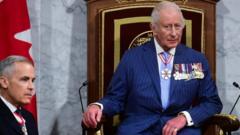King Charles III delivered a landmark throne speech in Ottawa, marking the opening of Canada's parliament and setting out priorities for the government of new Prime Minister Mark Carney, whose Liberal party recently won a general election. The King's address touched on several themes, particularly the sovereignty of Canada amidst renewed tensions with the United States and ongoing concerns about economic uncertainty.
The monarch, who serves as Canada's head of state, underscored the importance of Canada's independence, referring indirectly to US President Donald Trump's controversial statements regarding Canadian sovereignty. His message of patriotism came at a crucial time, as a potential trade war looms with the US, Canada's largest trading partner, often cited as a source of economic vulnerability. The King expressed his admiration for Canada's identity, citing its growth and self-assurance since last being represented by a sovereign in 1957.
One of the salient points of the speech was the evolving nature of global partnerships, with King Charles highlighting the changing framework of open global trade that has benefitted Canadians. He urged lawmakers to seize the present challenges as opportunities for transformative economic measures, echoing Carney's campaign rhetoric that positioned Canada at a pivotal historical moment.
King Charles also addressed domestic policies, including plans to enhance national infrastructure, remove barriers to interprovincial trade, and push for more Indigenous ownership in significant projects. These initiatives aim to tackle issues such as interprovincial trade costs, which are estimated to burden the Canadian economy by roughly C$200 billion annually. Nonetheless, opposition leaders criticized the lack of specific legislative plans accompanying these commitments.
Moreover, amid rising concerns over housing affordability that have plagued Canadians, the King reinforced the government's commitment to double home construction rates and cut taxes for first-time homebuyers. The speech also outlined measures to toughen penalties for crime, signaling a focus on public safety issues.
On defense, King Charles pledged a revitalization of Canada’s military capabilities, committing to reach NATO's required spending threshold of 2% of GDP by 2030. This reflects increasing pressure from the US and other allies for enhanced military contributions, alongside Canada's strategic strengthening in the Arctic region and partnerships in European defense initiatives.
The speech serves as a symbolic reaffirmation of Canada’s independence amidst external pressures, while setting a course for future domestic and international challenges. As King Charles III takes on this ceremonial role, his words resonate on multiple levels, defining a vision for Canada that encapsulates both pride and ambition.




















